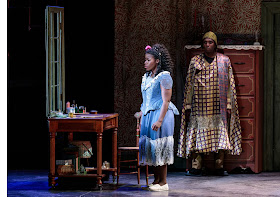MATTERS OF RELIGIOUS FAITH inform the two one-act operas comprising “Double Bill” at the Glimmerglass Festival, productions that show how effectively a small cast, a versatile set, and a virtuoso orchestra can convey the emotionally fraught content of these pieces.
 |
| Michael Mayes and Jacquelyn Matava Photo: Karli Cadel/The Glimmerglass Festival |
The relationship was too complicated for an easy farewell, as we learn in flashback scenes where the younger Kayla (a very effective Carly R. Carillo in a non-singing role) learns, from her father's aggressive efforts to impart fearlessness, to be anything but. As Daddy, Michael Mayes is appropriately flamboyant, sporting a big voice and shaking with frightening ecstasy in his shiny suit as he exhorts his congregants.
Although his wife, Nelda (Jacquelyn Matava) has learned to submit to his bullying, Kayla has rebelled. But her rebellion is emotionally incomplete, as the flashbacks reveal. This is where the tools of opera are most effective. Jerre Dye’s libretto is drawn from his own experience growing up amongst rural holy rollers, and offers a clear-eyed view of the consequences of that kind of cultish inculcation, where love becomes a bargaining unit.Composer Kamala Sankaram underscores the conflicts with a full tonal and textural palette. While the music isn’t aggressively tonal, it weaves nicely between the quotidian and the spiritual, utilizing time-signature elements to shift between notions of good and evil.
 |
| Mary-Hollis Hundley Photo: Karli Cadel/The Glimmerglass Festival |
The piece finishes in another kind of church: a hospital room, where moments of musical rapture ride against the ostinato of life-support beeps. Daddy is dying, Kayla seeks closure, but it’s Nelda who finally finds a simple path to a glorious salvation.
Salvation of another sort is at the center of “Holy Ground,” wherein composer Damien Geter and librettist Lila Palmer imagine an assembly of archangels seeking the delivery of the next Messiah. Yikes. The premise is that 489 virgins have turned down the job, but there’s a new candidate in their sights, so they decide to send the least-experienced angel, Cherubiel (the deftly funny Jonathan Pierce Rhodes) to persuade this particular Mary (Jasmine Habersham) to agree to the job.
While the premise is amusing, the piece isn’t really a comedy, despite a couple of slapstick moments. It’s hard to reckon Cherubiel’s strategy. He seems about to be undermined when Mary’s mother, Ann (Alyson Cambridge) insists on marrying the girl off to a man who doesn’t even appear in person at the ceremony. In other words, it’s a setup, designed to invite the Holy Spirit to fertilize the bride.
 |
| Jasmine Habersham and Jonathan Pierce Rhodes Photo: Karli Cadel/The Glimmerglass Festival |
It’s difficult to take in a story like this in a world where women have struggled for so long, particularly during the last century, to achieve a measure of equality and autonomy, only to have that autonomy wrenched away by a Supreme Court infected with religiosity.
Nevertheless, as with “Taking up Serpents,” I enjoyed the excellent score, one that darkly contrasts against the earlier piece. Set designer James F. Rotondo III put them on a two-level set that allowed for differing moods in different places, while director Chloe Treat drew out an absorbing combination of acting values and appropriate musical intensity.
The singing was never less than superb, and special praise goes to Glimmerglass Young Artists Taylor-Alexis DuPont, Helen Zhibing Huang, and Jeremiah Tyson, who appeared in a number of roles in both pieces. The virtuoso orchestra was conducted by Lidiya Yankovskaya.
Double Bill:
Taking up Serpents
Music by Kamala Sankaram, libretto by Jerre Dye
Holy Ground
Music by Damien Geter, libretto by Lila Palmer
Conducted by Lidiya Yankovskaya
Directed by Chloe Treat
Alice Busch Opera Theater
Glimmerglass Festival, Aug. 1, 2022
No comments:
Post a Comment